S.C. Skillman's Blog, page 59
September 1, 2014
Faded Grandeur, Unfinished Grand Schemes, Unfulfilled Dreams
I visited a National Trust property a few days ago – Lyveden New Bield near Oundle in the heart of the Northamptonshire countryside.

Lyveden New Bield (creative commons)
This is an unusual property in that it was build by an Elizabethan gentleman who left it unfinished. And it hasn’t fallen down, or been looted, or demolished, or built over, in the intervening centuries – but has just remained as it is.
There is something haunting and eerie about properties like this. The only similar one I can think of is Chastleton House near Moreton-in-Marsh, which has been left exactly as it was 400 years ago….. It hasn’t been specially prepared or restored by the National Trust to look as it would when at the height of its glory. It has just been left, like Sleeping Beauty’s Palace. There is a faintly sinister air as you explore its rooms and passages. You get the feeling that those who lived there have just vanished and it has remained suspended in time. A curious melancholy hangs in the air.
In the case of Lieveden New Bield, the designer and developer of this grand garden lodge, Sir Thomas Tresham, a wealthy and ardent Catholic, died before it could be completed. And his son Francis, instead of completing it and fulfilling his father’s dream, made a fatal error: he became implicated in the Gunpowder Plot, got arrested, confessed, and lost the entire family fortune.
Touring this unfinished, roofless property with all its elaborate Catholic symbolism, I couldn’t help feeling sorry for Sir Thomas and all his hopes and dreams. As I walked around, and listened to the audio-tour, I wasn’t thinking of the massive differences between ourselves in our modern world, and those in the early seventeenth century, with all the passions and concerns of the beleagured Catholics. I was thinking of the things I shared – which many of us share – with Sir Thomas. A grand scheme, a big dream, starting to come into reality…
In Sir Thomas’s case it was cruelly cut short. Yet he died with all his ardent Catholic faith and hopes intact. And all the elements of his original design for his garden and lodge are now being rediscovered, and might even be realised in the future: who knows.
To me, this is the value of visiting historical properties – enabling us to enter imaginatively into the deeply personal stories of those who lived centuries ago, and feeling not the things that separate us but the things we may have in common.
Filed under: architecture, British psychological suspense writer, buildings, design, dreams and dreaming, English countryside, faith, garden design, history, inspiration, life, musings, National Trust gardens, places I love, places of inspiration, religion, SC Skillman, SC Skillman Author, spirituality, thoughts, UK Tagged: deeply personal, dreams, fortune, future, grand schemes, hopes, imaginative, National Trust, passions, SC Skillman author, stories, suspended in time


August 25, 2014
Ancient Civilisations: Reflections From Stonehenge
Last week I was sitting in the café at the new English Heritage Visitors Centre near Stonehenge, listening to a conversation between two American visitors.

Stonehenge Aug 2014 (photo credit Abigail Robinson)
“Well,” said one, “I definitely think it was three things; a church, a burial ground and a place of healing.”
“You don’t mean church,” said her friend.
“Oh no. Well, a holy place. That sort of thing.”
People love speculating about why those who created Stonehenge went to so much trouble to transport huge stones from West Wales to Salisbury Plain to construct their monument which took many hundreds of years – at a time, 5000 years ago, when their own lifespan would probably have been only about 30 years.
Because of the wonderful new exhibition English Heritage have designed in the Visitor Centre, our minds are now filled with all the most up-to-date theories based upon the latest research. And we are now imagining those Neolithic people in a new light, and wondering about their skills in planning and design and organisation, in engineering and architecture and building – skills which are far beyond those we might have credited to them even a couple of decades ago – if we’d ever thought about them, that is.
Before this visit, I last went round Stonehenge a year ago, and even then I was moved by the story that English Heritage tell us through their wonderful audio guide.

view through a trilithon (photo credit Abigail Robinson)
But now I have new reflections. They are about the rise and fall of civilisations on this planet – and how easy it is for us to forget, or disregard, the sophistication and skill of previous civilisations that have disappeared.
Only a few centuries back, we are told, people “had no concept of prehistory.” In James I’s time, Inigo Jones researched Stonehenge and concluded it had been built by the Romans.
But no. Now we learn that this magnificent structure was begun by people who lived in 3000 BC.
How sure can we be that our own immensely sophisticated civilisation won’t disappear, to be lost to time, and forgotten by future races? Will they, I speculate, rediscover us and be amazed at the things we were able to achieve, which they would never have credited to us?
How many of us believe that all we have discovered and attained will last forever?
What will we leave behind for the people 3000 years into the future to wonder at and and admire? What will be left of us, to fuel their imagination, in just the same way that Stonehenge now fuels ours?
Filed under: British psychological suspense writer, buildings, culture, design, dreams and dreaming, empowerment, history, inspiration, life, people of inspiration, places of inspiration, SC Skillman, SC Skillman Author, thoughts, UK Tagged: ancient civilisations, English Heritage, holy place, SC Skillman author, Stonehenge


August 19, 2014
The Edinburgh Fringe Festival, Quirky, Anarchic, and Fizzing with Life
During the last week we’ve been at The Edinburgh Fringe Festival – an overwhelming variety of acts and shows and comedians and performers, all jostling for your attention. Those who are trying to make a name for themselves are free: the already established are in big venues and do paid-for shows.

On the Royal Mile, Edinburgh – The Fringe (photo credit Abigail Robinson)
I’ve never been handed so many flyers by so many people in such a short space of time as on the Royal Mile – it felt like every member of the crowd heading in my direction was handing out leaflets for his or her show. I recalled online tips for young actors trying to breakthrough at the Edinburgh Festival: “Be prepared to spend most of your time walking the streets and handing out flyers.”
You can be trying to decide where to go and then a troupe of actors dressed in white from head to toe with eerie white masks approaches you and leaflets you; and you decide you’ll go to their show instead.
Or you pass one of the free fringe venues, see something’s on in 5 minutes and just drop in because you happen to be passing by.
And that’s how we found ourselves in the audience at a free fringe event, facing up to whatever the comedians threw at us – including, in my case, a fountain from a shaken-up bottle of Irn Bru, because I happened to be sitting in the second row…
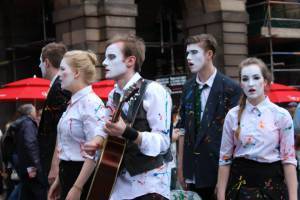
Troupe of actors advertising their show at Edinburgh Fringe – photo credit Abigail Robinson
We enjoyed Funtime Family Friendly Impro show, and a one-woman comedy show by Claire Ford called ConsciousMess. Claire showed brilliant clowning skills and I thought she’d be a good children’s TV presenter – with the exclusion of some of her material.

Street entertainment on the Royal Mile, Edinburgh Fringe Festival – photo credit Abigail Robinson
We also found ourselves in a marquee at The Ibis Hotel where we saw “The Grown Up Show” when London’s “best emerging comedians battle it out for the title of Worst Adult in the World”. I can assure you this was not family friendly, and one of the comedians – host Alexis Wieroniey – even queried our 2 teens from the stage about how old they were, having been about to deduct “adult points” from us for bringing children in, whereupon she realised it should be herself she deducted “adult points” from for designing the fun cartoon on the flyer! Upon being assured of their true age, the comedians then went on to present their material, packed with lewd humour about sex and bodily functions.
Seeing these “emerging” young comedians made me reflect again upon what I believe makes a great comedian: the ability to connect with the audience, win our confidence, show strong observation of life, say things we know are true and can identify with, and do it all with perfect comic timing.
And in the end, for a performer at The Fringe, what really counts is the way audiences take to you and whether you get noticed and given a chance by a casting director, agent or impresario.

Group of actors advertising fringe performance Chatroom on the Royal Mile – photo credit Abigail Robinson
Of the paid-for shows in The Festival we saw “The Lift” a new comedy by Fergus Deery at the Bedlam Theatre and “Potted Sherlock“, a fantastic whizz-through of all 60 Sherlock Holmes stories in 70 minutes by 3 excellent comic actors whose previous shows included Potted Potter, Potted Pirates and Potted Panto.

Street entertainer Simeon Baker on the Royal Mile, Edinburgh Fringe (photo credit Abigail Robinson)
For many creative actors and comedians, and for those who flock to Edinburgh in August, including ourselves, this Festival is all about fun, zanyness, and the principle of having been here and been involved with a show at the Fringe – however unpredictable.
Filed under: British, culture, life, musings, places of inspiration, psychology, SC Skillman, SC Skillman Author, stage drama, thoughts, UK Tagged: actors, breakthrough, comedians, comedy, creative, Edinburgh Festival, Edinburgh Fringe, life, quirky, SC Skillman, show


August 4, 2014
Add Mystical Circles To Your Holiday Reading!
Now summer is here and many will be relying on their trusty Kindle to provide hours of poolside or beach entertainment, why not download Mystical Circles now? It’s ideal holiday reading!
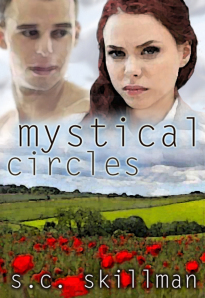
Mystical Circles by SC Skillman
Here are extracts from a few Amazon reviews to prove my point:
a good undemanding but satisfying read for the holiday suitcase. (Eleanor Stoneham)
I found once I got into the book I was keen to keep reading as I wanted to know what happened to each character next. (Lynda Alsford)
I would highly recommend this book as it is easy to read, a page turner and one where you are always trying to piece together the puzzle. You won’t be disappointed. (Edwina Jaycock)
Read the entire book in less than 24 hours – couldn’t put it down! I was really interested in the rich developing characterisations and the twists kept me guessing right to the end. Highly recommended. (Jack C.)
This turned out to be an ‘into the early hours’ read! Once I’d started, I couldn’t stop following the story of freelance journalist Juliet as she finds herself caught up in an intriguing mix of characters at the Wheel of Love – a cult centre in the heart of the Cotswolds. (Caroline Bailey)
an intense and compelling story with many twists and turns in the plot to keep you reading. (Eleanor Watkins)
I found this book a very entertaining read, with plenty of action and sparky dialogue, with an intriguing darker side ever present. (Mike P.)
Filed under: book reviews, Books, British, British psychological suspense writer, creative writing, literature, Mystical Circles, psychological suspense fiction, SC Skillman, SC Skillman Author, travel, UK, Writing Tagged: holiday reading, kindle, mystical circles, SC Skillman author


July 28, 2014
Folk Festival Fun for Warwick
This weekend Warwick hosted its annual Folk Festival.
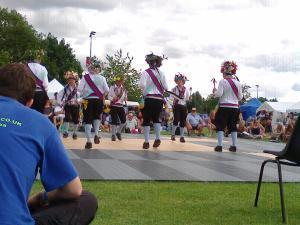
Morris Dancers (photo credit Abigail Robinson)
Folk dancers and singers were out in force together with a wide variety of creative stallholders and vendors, and everywhere we saw bright coloured clothes and gypsy-style skirts and hats decorated with flowers.
In common with many others I love to watch to listen to folk songs and watch folk dancing; it strengthens our sense of community and connects us with our traditions and our agrarian culture of centuries ago.
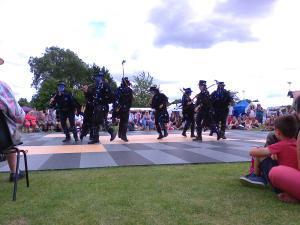
Mummers (photo credit Abigail Robinson)
There is always a tendency to idealize life in Britain before the industrial revolution, when those in the country villages practised all sorts of traditional customs, many related to our superstitious beliefs of the past.
And yet folk memory is strong within us, and it can never be eradicated. It reappears in so many ways in our contemporary lives; in lingering folk religion and folklore, in our language, and in our actions, whether conscious or unconscious.
I love to watch the mummers and the morris dancers, and to see their eccentric costumes and the vigorous, energetic dances.
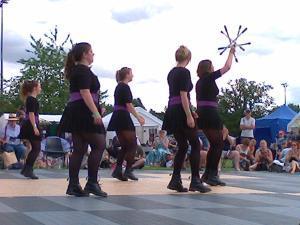
dancers at the Warwick Folk Festival (photo credit Abigail Robinson)
This is a part of English society that we can well celebrate, long into the future.

Bruce Knight conducts the Warwick Folk Festival Choir (formed 6 weeks before the festival)
Filed under: culture, English countryside, history, inspiration, life, love, music, nature, religion, SC Skillman, SC Skillman Author, spirituality, thoughts, UK Tagged: creative, English folk dancers, English society, Folk Festival, folk memory, folk religion, folklore, life, love, SC Skillman author, Warwick


July 21, 2014
People of Inspiration: the Much-Loved Pythons We’ve Followed Through the Years
Last night I watched the final live Monty Python show broadcast from the O2 arena and delighted once again in those famous sketches, performed by the original Pythons, less of course, Graham Chapman.
I recalled one night at university when I sat on a bed with a group of fellow-students, and one got hold of my copy of Monty Python’s Big Red Book. He then read the book aloud to us, word by word, for the next several hours, and we spent most of the night laughing hysterically.
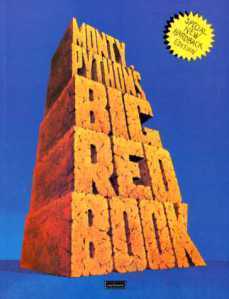
Monty Pythons Big Red Book Cover
In fact I believe the Python humour translates to the printed page even better than to TV. That event is probably why certain images and phrases remain in my mind, like the address Behind the Hot Water Pipes, Third Washroom Along, Victoria Station; and why I remember the Whizzo Speed chocolate assortment, and Doug and Dinsdale Piranha, (who I have occasionally wished I could put into a novel but realised it would be plagiarism), and also Miss Gloria Pules, who when interviewed about the Piranha Brothers, said they were wont to introduce one to eminent celebrities.
At the 02 Arena, the Dead Parrot Sketch and the Argument sketch were to my mind as good as the originals. The Spanish Inquisition sketch didn’t have, for me, quite the same impact when the comfy chair was threatened. And a bit was missing out of Postal Blackmail.
Nevertheless it was wonderful to see Eric Idle, John Cleese, Michael Palin, Terry Jones and Terry Gilliam on stage acting the classic sketches.
Monty Python has infused everything each has done subsequently. I have followed and enjoyed their creative work over the years, and loved them because they were Pythons; I’ve watched the films and the TV programmes, read the books, listened to the songs. I queued up outside Waterstone’s in Kensington High Street, London, to buy a copy of Terry Jones’s Fairy Tales and have it signed by the author and illustrator.
In all they have done, the Pythonesque secret language has been there somewhere, that anarchic, surreal element, the parody of a parody of our British society, that we, embedded in that society, all innately recognise and understand, to such an extent that it can be instantly recalled with the words: This is an ex-parrot or Is this the right room for an argument? or Nobody ever expects the Spanish Inquisition.
I was also thrilled to discover that John Cleese, like myself, loves Roget’s Thesaurus; which played a large part in creating the most memorable lines in the Dead Parrot sketch.
Do you too love the Pythons? do share what the Pythons mean to you, by commenting on this post!
Filed under: 1960s, About Books I love, Authors I love, book reviews, Books, British, films, inspiration, life, London, love, media, movies, musings, people of inspiration, SC Skillman, SC Skillman Author, stage drama, thoughts, TV programmes, UK Tagged: Eric Idle, Graham Chapman, John Cleese, love, Michael Palin, Monty Python, much-loved, Python live show 02 arena, SC Skillman author, Terry Gilliam, Terry Jones


July 14, 2014
The Therapeutic Journey of the Fictional Hero or Heroine
Recently I came upon an article in The Psychotherapist magazine which highlights the close parallels between the novel and the process of psychotherapy.
In her article Psychotherapy and the Novel, in issue 56 Spring 2014 edition, the author (therapeutic counsellor Rosamond Williams) makes the point that only the novel (of all the narrative art forms) offers a parallel detail to the process of psychotherapy, in the exploration of relationships, thoughts and feelings.
Rosamond Williams cites as examples the following novels: Jane Austen’s Emma, George Eliot’s Daniel Deronda, Dickens David Copperfield, George Eliot’s The Mill on the Floss and Charlotte Bronte’s Jane Eyre, as well as Doris Lessing’s The Golden Notebook.
In all of these we can trace the hero or heroine’s learning curve through their confusions and unsatisfactory relationship to resolution: a very therapeutic experience for the reader as well as for the main protagonist.
I can bear out everything she says not only in my reading, but in my own novel-writing.
In Jane Austen’s Price and Prejudice for example, I believe there are many other universal truths, equally valid for our own lives in 2014 just as they were in Regency England, that we can learn, well beyond the ironic and flippant one in the first line: that a single man in possession of a fortune must be in want of a wife.
Here’s just a small selection of the truths, helpful for a therapeutic journey, that I’ve picked out from Pride and Prejudice:
1) even the most outrageous person, behaving badly, can end up getting what he or she wants;
2) no matter how mortifying and objectionable, that person can still be playing a vital part in the chain of events leading to a final positive outcome;
3) when you’re at your saddest and most disappointed, convinced you’ve lost all your hopes and dreams, you don’t know what is going on behind the scenes;
4) when all seems lost, help can sometimes come from the most unexpected quarter;
5) sometimes people do the most disgraceful things and end up triumphing through it, because of the links and connections they’ve unwittingly set up between other people;
and
6) sometimes you can, through your own wrong-headedness and flawed attitude, interfere to try and stop a certain event happening, and end up being the vital factor that facilitates it.
I can identify, too, with the psychotherapeutic journey in my own fiction-writing. In my upcoming novel A Passionate Spirit, my heroine, Zoe, sees her situation as perfect and ideal; when negative influences start to creep in, she denies them; through her stubbornness she continues her denial until she is goaded by a friend with a totally different outlook on life to recognise the threat for what it is. Only when the antagonism has become too great for her to ignore, she makes a critical choice to take responsibility and act to oppose the menace which is engulfing her life.
To me this closely parallels the journey one may take in psychotherapy.
Filed under: About Books I love, Authors I love, book reviews, Books, British, British psychological suspense writer, creative writing, empowerment, inspiration, interpersonal relationships, Jungian psychology, life, literature, love, musings, people of inspiration, psychological suspense fiction, psychology, SC Skillman, SC Skillman Author, thoughts, UK, Writing Tagged: fictional hero, fictional heroine, Jane Austen, Pride and Prejudice, psychotherapy, SC Skillman author, the novel, therapeutic journey, universal truths


July 7, 2014
A Night When Neil Gaiman – Quirky, Subversive, Whimsical – Held Us Entranced at the Barbican Hall, London
Last Friday evening I was at the Barbican, London, to hear author Neil Gaiman read some of his short stories plus a novelette called The Truth is a Cave in the Black Mountains, accompanied by the Australian string quartet Four Play.
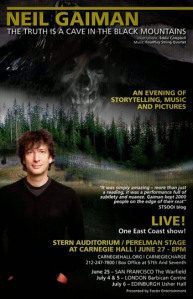
Neil Gaiman in The Truth is a Cave in the Black Mountains at the Carnegi Hall June 2014
This production was originally commissioned by Sydney Opera House for its Graphic Festival and we saw the first of two nights at the Barbican to be followed by one night at Usher Hall in Edinburgh.
Having read and loved Neil Gaiman’s novels Coraline and The Graveyard Book I was looking forward to seeing this with my two teenage children. From his books and his tweets, I expected Neil Gaiman to be more zappy and over-the-top in person; but he isn’t; he’s gentle and laidback and low-key in his manner, with a self-deprecating humour.
Surely this is the best persona for him to adopt as he tells his tales. Anyone who knows his work expects a playfully dark twist. And this was fully realized in his novelette The Truth is a Cave in the Black Mountains. In this he has chosen to create a Scottish tale, a grim and sombre story of revenge, written with a poetic quality appropriate for a tale from the Outer Hebrides set at the time of the Jacobite rebellion.
It was accompanied by big-screen projections of the illustrations by Eddie Campbell which were astonishingly vivid and real, by turns haunting, harsh and beautiful, conveying the atmosphere of the terrain and the ever-darker direction of the story. We were held captivated throughout Neil Gaiman’s narration; the musicians accompanied the tale with such emotional intelligence and imagination, it was an outstanding display of creative genius.
The story of the dwarf who goes searching for the cave of gold, accompanied by the mysterious tall “border reaver”, has played on my mind ever since, as I considered the rhythm and poetry of it, the elements of darkness and horror, and the moral lesson that lay behind it.
An evening which will stay in my mind for a long time.
Filed under: Australia, Authors I love, book reviews, Books, buildings, classical music, creative writing, inspiration, life, literature, London, love, media, people of inspiration, places of inspiration, SC Skillman, SC Skillman Author, thoughts, UK, Writing Tagged: author, Barbican Hall, Eddie Campbell, FourPlay string quartet, London, Neil Gaiman, SC Skillman, Sydney Opera House


June 30, 2014
The Fault in Our Stars and Poignant Reminders of Short Lives on Milverton Hill
Recently I went to see the film The Fault in Our Stars with my two teenage children. Based upon the book of the same name by John Green it was about two teenagers both diagnosed with terminal cancer, who form a relationship at a cancer support group, try to avoid falling in love because of their life-limiting illnesses, and then do fall in love, before one of them dies.

Old Milverton Churchyard 27 June 2014 (photo taken by SC Skillman)

Abigail with Jeni the dog near Old Milverton Churchyard 27 June 2014 (photo taken by SC Skillman)
Along the way, many wise observations are made about life and death and mortality, and the way we handle death in this society, and our failure to speak the truth or be “real” in the presence of life-limiting illness.
This was such a poignant film, especially the scene in Anne Frank House in Amsterdam, where both are brought face to face with another teenager whose life was also cut short – for a very different reason.
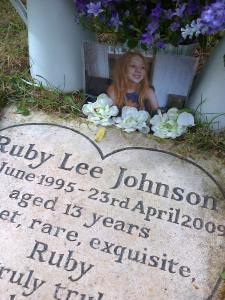
Ruby Johnson’s memorial plaque at Old Milverton Churchyard 27 June 2014 (photo taken by SC Skillman)
With this film in my mind, we recently made a walk up Milverton Hill to Old Milverton Church, near my home in Warwick, where there is a memorial plaque to Ruby Johnson (one of my daughter’s former fellow-pupils at school) who died of leukaemia in 2009 age 13.
Walking up this hill to Old Milverton Church is always poignant for me, because I now associate the summit of that hill, and that quiet churchyard, with Ruby’s lovely and touching memorial.
Filed under: Books, English countryside, films, inspiration, interpersonal relationships, life, love, media, movies, musings, places I love, places of inspiration, SC Skillman, SC Skillman Author, thoughts Tagged: Anne Frank House, death, fault in our stars, John Green, life, life-limiting illness, love, mortality, Old Milverton Church, poignant, Ruby Johnson, SC Skillman, short lives, truth


June 23, 2014
Sir Antony Sher in Shakespeare’s Henry IV Part II at Stratford-upon-Avon: the Powerful Impact of One Picaresque Character, Performed by a Great Actor

Antony Sher as Falstaff in Henry IV Part II at the Royal Shakespeare Theatre Stratford-upon-Avon 2014
shone out as Sir John Falstaff in the Royal Shakespeare Company’s production of Henry IV Part II which I saw the other day in the Royal Shakespeare Theatre in Stratford-upon-Avon.
I was at the camera rehearsal for Henry IV Part II, the day before the production was to be broadcast live to cinemas.
As I watched Antony Sher commanding the stage as Shakespeare’s irregular humorist Sir John Falstaff, I remembered another time when I saw the same actor perform – it was at least 28 years ago in Brisbane, Australia, and he played Richard III, scuttling about the stage like a giant spider. I’ve never forgotten that performance. This time he made me reflect once again upon the charisma and power of a great actor, no matter the role he plays. You would think that the king himself would command the stage; but no, it was the low-life ne’er-do -well, the gluttonous lustful drunkard Falstaff, who did that.
For me, the most memorable moment of the play came when Sir John Falstaff bounds up to the newly-crowned Henry V, knowing that the former Prince Hal had once been his regular companion in the brothels and taverns of Eastcheap, London. He throws his arms wide to reclaim his former intimacy , in the hope and expectation of new honours and favours to be bestowed upon him now his former companion is successful, powerful, all-important… and the new king says to him:
“I know thee not, old man!”
The silence that then falls, as Falstaff sees that he has fallen from grace (if such it could be called), is poignant and profound.The new king proclaims that he has turned away from his former self, as one does from a dream one despises. And somehow, all that we might feel upon confronting our mispent past, and renouncing it, is encompassed in that moment.
Last month I read an interview with Sir Antony Sher in Warwickshire What’s On magazine. He talked about his career and how when young he was turned down for drama school. He was asked about how an actor moves forward in his talent to become great, and during his reply, he made this point:
Richard Burton had the most exciting talent which somehow he wasted… a special gift as an actor but he stopped caring about it… just sat back in his talent rather than pushing himself and exploring it. You’ve got to keep alive this very special job you’re doing… Meryl Streep has kept a certain integrity to her craft.
Surely this act of pushing and exploring is universally true of the creative life. I was reminded of those words as I came away from the Royal Shakespeare Theatre, with the stage-presence of Sir Antony Sher singing in the air around me.
Filed under: Authors I love, history, inspiration, life, literature, London, love, musings, people of inspiration, places of inspiration, SC Skillman, SC Skillman Author, stage drama, thoughts, UK, Writing Tagged: creative life, Henry IV Part II, Royal Shakespeare Theatre, SC Skillman, Sir Antony Sher, stage presence, Stratford-upon-Avon, talent





